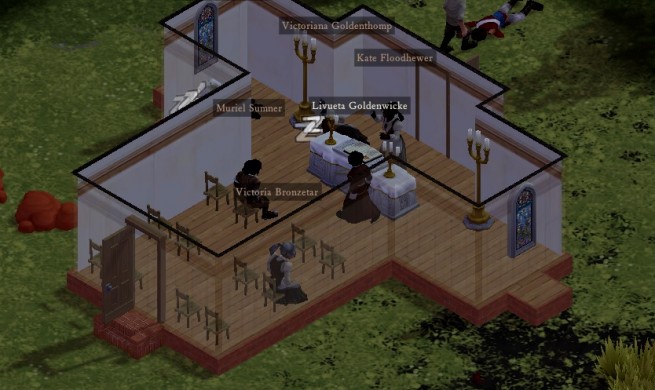As we carve out new systems, it’s good to take some time to go back and refine earlier ones. At this point, our UI has been built out enough that even artists like myself can make additions and improvements; with Nicholas and Dan busy working on Fun New Stuff, I’m taking time to start poking at the offices that allow you to control your colony’s operation!

Stop sleeping in the chapel, you vagrants!
When Chapels were originally implemented, they were a one and done happiness-increaser for your colony (and sometimes a cultist-quasher). However, the pub, added later, more or less fills the same role – and more interestingly, as far as I’m concerned. (Though it needs some love, too.) Breaking out the chapel into its own unique role seemed like an appropriate first task, and an opportunity to bring some new choices into the game.
So, what can the New And Improved Chapel do for you? Reducing madness and increasing happiness is one thing, but now it can act as a way to spread your preferred policies across the colony via your selection of Doctrine. Doctrines allow your vicars’ sermons to provide various benefits to the colonists who hear them.

Soldiers who failed to listen to their daily Episcopal sermon.
For the first implementation, you’ll have a choice of one of four doctrines; ideally, the spread available here will provide you with some interesting choices based on what you’re up to at the time. Initially they’ll all be available for free, but we may consider locking them behind conditions over the long term. (Also: you can thank David for the doctrine names.)
- Clockworkian Ecumenism is the default doctrine, more or less defined as no doctrine. Everyone enjoys it, but it doesn’t do much outside of happiness.
- Unreformed Episcopal Deism preaches discipline, a mindset your military will appreciate – they’ll be happier, gain morale, and be spurred to train harder.
- Muscular Ecclesiasticism preaches hard labor over all, and will spur your colonists to train their skills twice as fast. This work comes at a toll of unhappiness, however!
- Predestinational Mechanists preach the value of the nobility and sciences; your diplomats, scientists, and aristocrats will all be pleased – you’ll also find your science and diplomacy point gains sped up.

The new chapel UI! Look at those lovely Doctrines. (We also tell you how many chairs are available for congregants.)
This system is subject to some pretty serious iteration, especially once we get player feedback; I’m pretty excited to see what people make of it, and to continue working fleshing out additional workshops!

Could the cult system tie into this somehow? For example, the decision to allow the building of shrines? Also I feel like a new list of doctrines should open up if a cult member happens to be the vicar…
Why, that is quite a good idea. However, this leaves us with a question, how many variants should every cult have. If my memory doesn’t fail me, there are three different cults now, a generic one, a Fishman one and an Obeliskian one.
But, using cults to change the dynamics of diplomacy with the more eldritch factions is an interesting idea.
Zero seats?
I imagine that’s because the last seat was crushed under Cultist Artefact, I assume?
The idea of doctrines is great, but I don’t think the ones you’ve implemented are particularly interesting. I think it could be done in such a way as to create much deeper choices.
For example, the player could be given a choice between a more accepting doctrine or a xenophobic one. You could choose to be open to other factions, making good Fishperson relations easier, but your military would gain a debuff and your colonists would complain if you took a hard line against bandits. Alternatively, if your vicar preaches strength through unity and purity, your military gets stronger but your colonists might, of their own volition, take actions that would strain diplomatic relations with your erstwhile allies.
I think you could probably build in a whole series of such doctrine choices, each affecting multiple systems. Frugality versus efficiency, where you could trade off cheaper building and repair costs versus length of work actions, possibly also effecting food consumption and happiness. Artisanal pride versus industrialism, trading skill-learning speed against action completion speed. There’s loads of great possibilities, especially once you start adding connections into character traits.
Basically, I absolutely love the possibilities of this addition, but I think your current implementation is far too limited in scope.
I get where you’re coming from – beleive me, I understand the desire to make systems complex and interesting – but for what it’s worth, there’s a lot to consider here;
* If I spend a month making it super complicated and interlinked, what happens when one or all of those systems, including doctrines themselves, are changed in the future? Doing this stuff right (IE: Not in a way that will cause bugs the next time someone touches the system) means figuring out use cases and building templates wherever possible; starting simple and iterating more complex is easy. Starting complex immediately has the potential for a -lot- of wasted work as the game evolves. Light = flexible, and flexible is what we need to respond to player feedback.
* Making any system complex imposes an equally big burden on us to convey those systems to the player. I’d call the current conveyance ‘just barely tolerable’ for the complexity vs how much is communicated to the player. If things happen but the player can’t tell that things are happening, or how, or why, it might as well not exist – we learned this very early in development. That means putting extra time into features that help players figure stuff out before we get too crazy. (Something I’m working on for this month as a whole, actually.) Additionally, we’re a very small team, and making systems deep is -very- time consuming. We have to be picky about where we choose to apply that time.
So, in short: I get ya, but the realities of development mean this kind of implementation makes the most sense to start with. We’ll be revisiting and paying attention to this system – and all of them, really – as we continue development, but complexity will come slowly and iteratively where it comes. It’s just only way to make a game this big!
It’s a fair call. All I’ll say is that I think this is one of the mechanics with the most potential that you’ve added in some time, and that I really hope you eventually fully flesh it out.